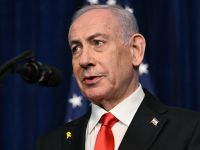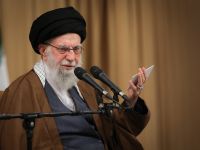It was a move that was so audacious that there could be little doubt what reaction it would evoke. When Sheikh Hamad bin Ali bin Jabr Al-Thani—the head of the Gulf Falcon Air Services Company and a relative of the ruler of Qatar—gave a Boeing 747 jumbo jet to Iraq in a display of solidarity with the beleaguered President Saddam Hussein, there was little doubt that Washington would react.
And that’s just what happened. Last Friday, the US government announced that it would restrict the export and re-export of a broad category of US-origin goods to Al-Thani. Tersely explaining its decision, the US government said that the goal of the sanctions is “to prevent any further diversion of US origin goods to Iraq that are inconsistent with United Nations Security Council Resolutions.”
It was only one in a number of incidents that has shaken Qatar’s relations with the West to the core. As the tiny Gulf state prepares to take over the presidency of the Organization of Islamic Conference (OIC), it appears to be going out of its way to thumb its nose at things Western, and particularly American.
During the week leading up to the November 12-14 OIC Summit in Doha, countries such as Saudi Arabia, Iran and Lebanon threatened to boycott the meeting unless Qatar broke its diplomatic ties with Israel. It had been the last Arab state without full diplomatic relation with Israel not to do so. Several weeks earlier, Morocco, Tunisia and Oman had all broken relations with the Jewish state, but Qatar conspicuously was silent. But just before the OIC gathering was to open, Qatar closed the Israeli trade office in Doha.
For years, Qatar has been regarded as one of the most pro-Western Arab states. During the Gulf war, it allowed the US-led coalition forces to fly tactical missions over Kuwait from Qatari bases. And after the war, it has agreed to store weapons sufficient for a US brigade on its soil.
In 1995, Qatar was the first Arab state in the Gulf region to establish commercial links with Israel, and in November 1997 Doha hosted the fourth and final Middle East Economic Summit, which aimed at fostering regional economic projects and included a large Israeli delegation.
Qatar even entered into negotiations to supply Israel with natural gas, initially in liquified form to be supplied by ship. It also was reported that, if a successful continuation of the peace process makes it possible, the Qataris were prepared to consider funding the construction of a pipeline through neighboring countries that would bring natural gas directly to Israel.
It is likely that Qatar’s new bold foreign policy bravado is not only a result of its new status in the Islamic world. It also is experiencing a period of extreme economic confidence, and evidently feels that there is little that can threaten it. Fuelled by buoyant world energy prices and rising oil and liquefied natural gas (LNG) production, nominal economic growth is projected to reach 20 percent this year, following an 18.9 percent expansion in 1999. In addition, this year’s exports are expected to rise by more than 25 percent, while the current account surplus will surge by 31 percent.
These figures are even more remarkable considering Qatar’s relative price stability. Inflation, which amounted to 2.2 percent in 1999, is predicted to rise marginally to 2.7 percent this year and 3.5 percent in 2001.
And while it is thumbing its nose at the west, Qatar is also opening itself to the outside world. Recently introduced investment legislation permits outside investors to own a 100 percent stake in several sectors—including agriculture, industry, health, education and tourism—and to lease land for up to 50 years. A government decree also empowers the finance ministry to grant tax exemptions to foreign-owned firms for 10 years, and to waive customs duties on the import of equipment, machinery and raw materials. However, several sectors, such as banking, insurance, commercial agencies and real estate, will continue to remain off-limits to complete foreign ownership.
For the foreseeable future at least, the most lucrative investment potential for international firms remains in Qatar, which is developing its natural gas and petrochemical industries. Foreign oil companies are also expected to be involved in assisting the country in expanding its oil capacity from the present 720,000 barrels per day (bpd) to a desired 1 million bpd.
And a note of caution. While the oil and gas sector expanded by 53 percent last year, non-oil sector growth was negligible. Qatar’s per capita GDP, which equals a heady $25,234 this current year, would plummet should oil prices tumble. Qatar’s economy and possibly its political courage may become victims of the same affliction. — (Albawaba-MEBG)







